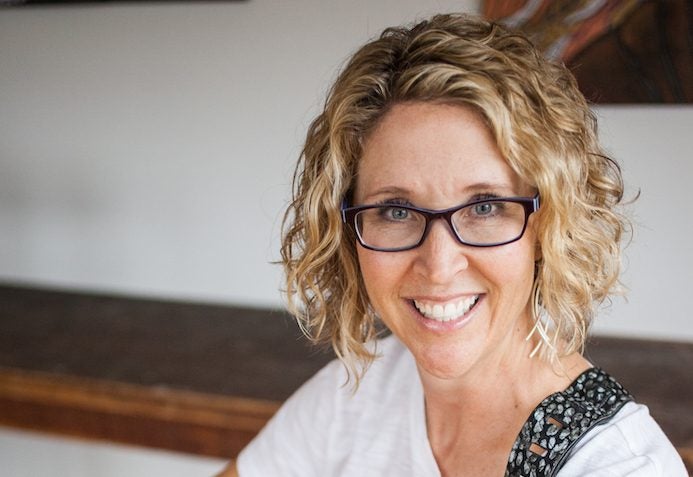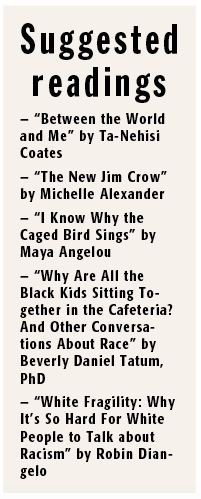SMITH: Will we shut down or will we shut up and listen?
Published 11:51 am Friday, June 5, 2020

- Erin Smith is the owner of the OM place in Winchester, the author of “Sensible Wellness” and the online host of the OM channel. Follow her on Twitter @erinsmithauthor.
|
Getting your Trinity Audio player ready...
|
I can remember the exact moment I realized how much I do not know about systemic racism and unconscious bias.
I mentioned to my friend Jazmin that I was colorblind and her eyes filled with rage.
“That is so not a thing!” she said. “I am so tired of white people telling people of color that they are colorblind. What, you cannot see that my skin is black while yours is white? You are unaware that this country was founded on the idea of pale people stealing land and life from people of color? You have never seen a picture of a lynching? And you didn’t notice that the dead person in the tree was black while the people proudly posing beside him were white? You’re going to sit here and tell me you don’t know why a Confederate flag makes you feel nauseous?”
She was crying now. She was so frustrated with my denseness.
“Denial of racism is how racism has survived, Erin,” she told me. “We will never be free from our painful history until we are honest about it.”
In that moment, I did a brave thing and said nothing. I did not defend myself, did not “whitesplain” that I was literally talking about being colorblind (as in, I am literally colorblind. I can see that her skin is black, but I couldn’t tell what color her shirt was. My eyes don’t absorb light particles like the average bear).
How many times had Jazmin had unfair assumptions made about her?
What I realized in that moment was that the word held decades of pain for Jazmin. So I just listened.
I realized it is my responsibility to understand systemic racism precisely because of my unearned privilege.
Privilege is power.
One of my spiritual assignments here at Earth School is to hand the microphone to the marginalized.
I get 800 words each week in which to tell you about my experience as a privileged white woman.
My life experience means I can go jogging without the fear of being shot. I can go bird watching without someone calling the police in panic. I can sleep soundly in my bed without worrying that someone who has taken an oath to uphold the law will break in and murder me in my sleep.
If I am arrested, I most certainly will be detained peacefully and respectfully.
A few years ago, I was part of Winchester’s Public Innovators Lab.
The Greater Clark Foundation held a two-day training where attendees worked to locate the challenges in our community, acknowledge our blind spots around those challenges and seek innovative ideas in solving them.
In the Lab, I joined a group that eventually became Better Together Winchester, an initiative designed to help everyone understand systemic racism.
I was saddened by what I heard from the local black community, but frustrated that the people that really needed to be a part of those conversations — a lot more black people, but also our local, mostly white politicians — were the exact people missing from the meetings.
What I heard was that, for the most part, people of color find it enraging that white people are still “shocked” when racism occurs.
Why would we be shocked by the events involving Trayvon Martin, Eric Garner, Ahmaud Arbery, or George Floyd? It is belittling that whites are surprised by this violence. From a black perspective, it’s just standard operating procedure.
Blacks don’t want our thoughts and prayers, nor our apologies. They want us to understand.
My take-away was that, before I can advocate, I must have a better knowledge base.
I reached out to my black friends and had real and often painful discussions about what it feels like to be black in America.
I listened and tried hard not to defend myself or shut down. I asked each of them to give me a reading assignment (see an abbreviated list).

Those of us with white privilege talk too much. We’re quick to post memes on social that aim more to convince others that we are not racist than to spark empathetic discussion or understanding.
It takes 15 seconds to read a meme and ”like” it, but it takes real commitment to confront our shortcomings and acknowledge that we are part of the problem.
Posting some woke quote doesn’t make us woke.
Once we know more, we can stand up and speak out. Through peaceful protesting. By calling racism out when we encounter it. By donating to and volunteering for black-led organizations. By using our seat at the table to amplify the voices of more black people.
Perhaps most importantly, we must vote. If we are ever to see an end to systemic racism, we must elect more officials of color to address and adjust the policies that allow structural inequalities in income, education, employment, criminal justice and access to health care to persist.
I’m not there yet. I bet most of us aren’t.
Will we shut down or will we shut up so that we can eventually stand up and speak out?
Erin Smith is the owner of the OM place in Winchester, the author of “Sensible Wellness” and the online host of the OM channel.





